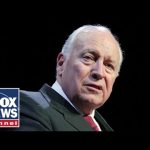America lost one of its most unapologetic defenders this week when former Vice President Dick Cheney passed away at age 84, surrounded by family after a lifetime of service to the Republic. For patriots who value strength over sentimentality, Cheney’s death is a moment to reflect on a career devoted to protecting American lives and liberty, not an occasion for cheap partisan gloating. His passing was confirmed by family and reported across the nation’s news outlets, closing the chapter on a man who never pretended to prioritize popularity over security.
Cheney transformed the vice presidency from a ceremonial sinecure into a bulwark of executive resolve at the moment our country needed it most, stepping up after the terror of 9/11 to ensure the nation did not flinch. Where others hesitated, he argued for a unitary executive capable of striking decisively at enemies who sought to slaughter innocent Americans, and that steel is why so many of our children still sleep safely at night. History will debate methods, but you cannot honestly dispute that Cheney’s guiding principle was simple and pure: protect the homeland at all costs.
Yes, Cheney presided over controversial programs and embraced harsh interrogation techniques that made his opponents howl, but conservative readers should recall the context — a nation reeling from slaughter and determined not to be caught flat-footed again. Those who reduce the man to caricature ignore the reality that leadership sometimes requires morally freighted decisions when the greatest stakes are on the line, and Cheney always made clear he would err on the side of American lives. If the choice is between timidity and protecting citizens, patriots know which path we prefer.
The wars in Afghanistan and Iraq remain wounds on the national conscience, and reasonable people must acknowledge intelligence failures and misplaced assumptions about Iraq’s WMD programs. Still, Cheney’s critics forget that the administration acted on the intelligence available and a strategic judgment about threats that, in the chaotic fog of the early 2000s, demanded action rather than paralysis. Conservatives can and should debate strategy, but we must never excuse the revisionist impulse that would punish boldness in defense of the country.
Cheney’s later break with Donald Trump and his public support for other candidates stirred anger among many in our movement, and that split reveals the complexity of a man who put country — by his lights — above party. Love him or disagree with his later political choices, his fierce advocacy for constitutional order and his willingness to call out abuses of power, even from within his own team, speak to a character that defied lazy labels. The conservative movement will be stronger when it learns from his conviction without sanctifying every tactical choice he made.
Beyond headlines and policy battles, Cheney’s life was one of relentless duty — from Congress to the Pentagon to the vice presidency — and he paid a steep personal price in health and privacy for carrying those burdens. His long struggle with heart disease and decades of service to the nation are reminders that leadership exacts real costs, and the media’s rush to moralize his legacy often neglects the human toll of public service. Conservatives should honor that sacrifice even as we engage honestly with the controversies.
Let there be no mistake: Dick Cheney was a man of conviction who believed the first obligation of government is the safety of its people, and that belief guided decisions few others had the stomach to make. As the left scrambles to rewrite the record, decent Americans ought to remember the courage it took to stand firm in the face of threats and the consequences of hesitation. We will argue about policy for years to come, but for now, honor his service, learn from his firmness, and resolve to keep America secure in the perilous world he warned us about.




